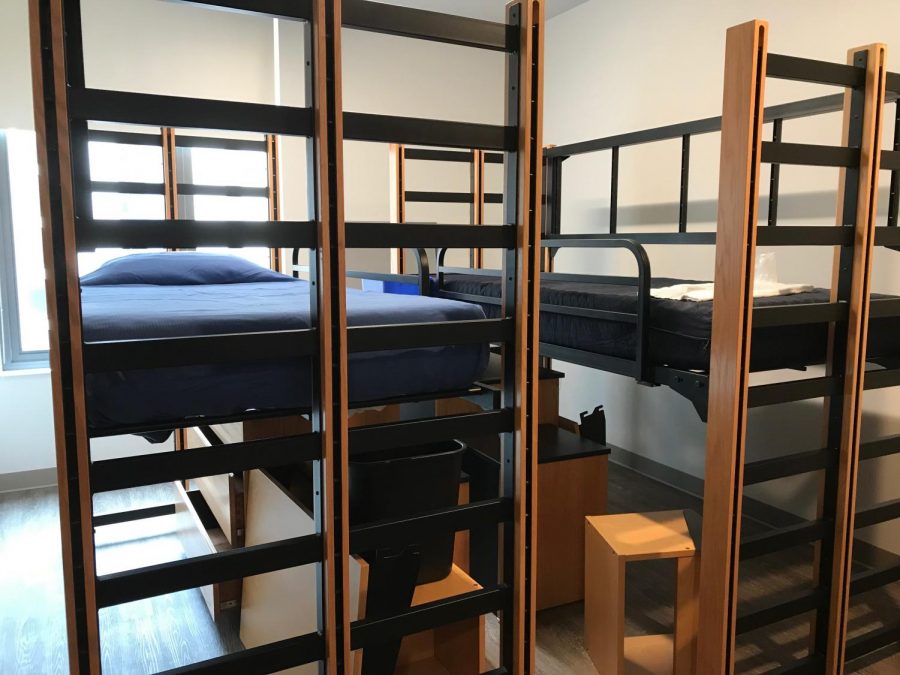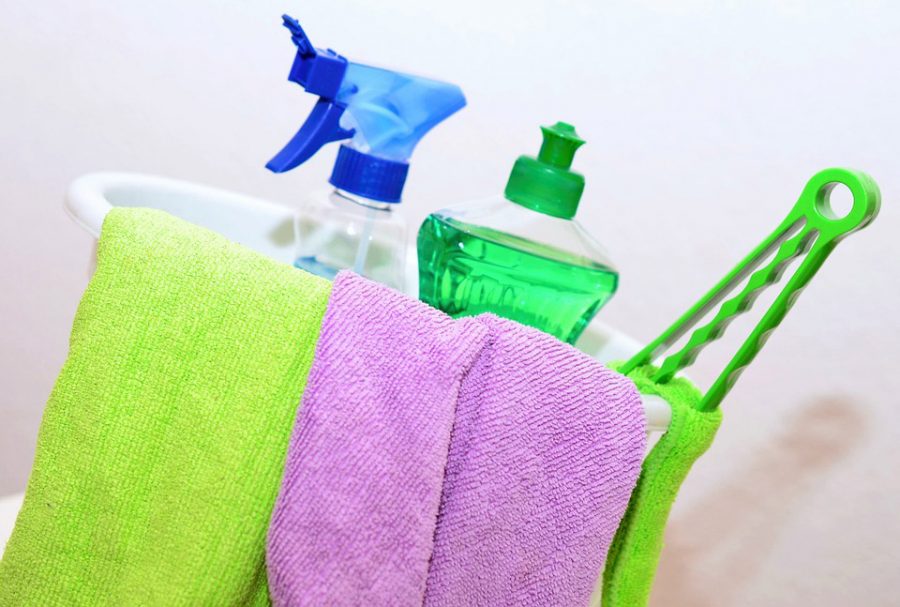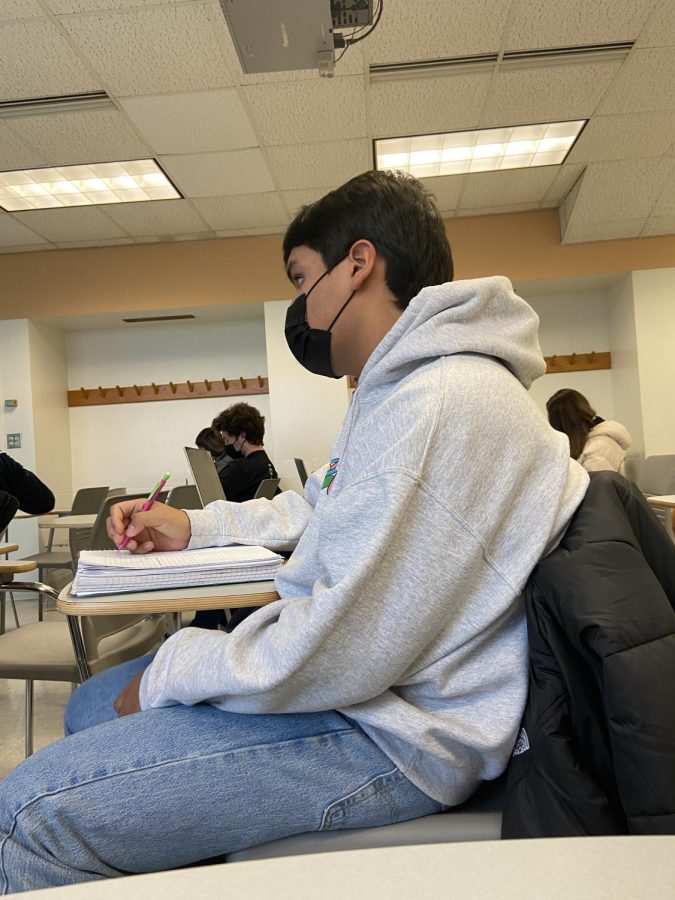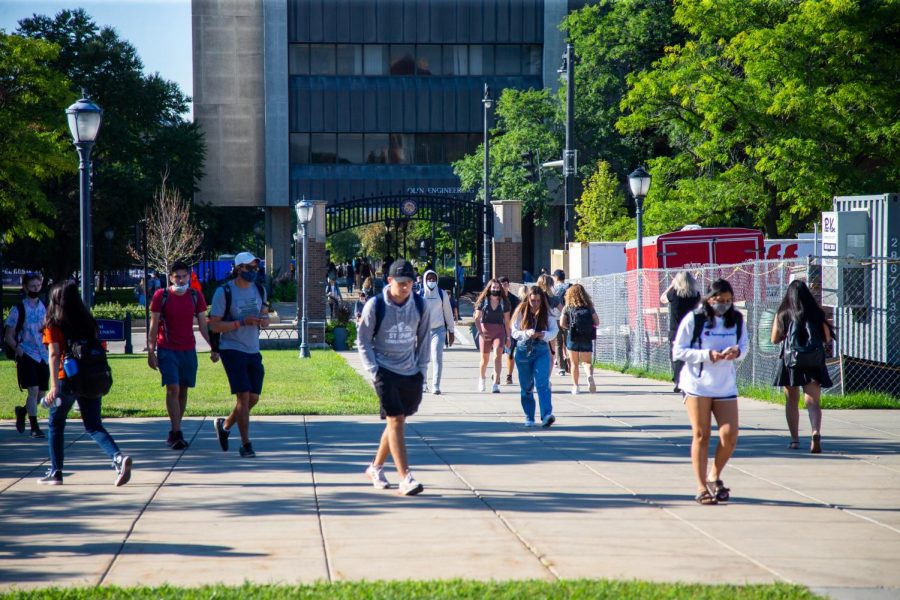As Marquette starts reopening following the COVID-19 outbreak and subsequent closures of residence halls and university buildings, the university is working to clean, disinfect and ensure the safest opening they can.
Amid a global pandemic, facilities services have to change.
Mike Jahner, director of facilities management, says the biggest change the facilities department made this summer was with the chemicals they use. He says they worked with the Marquette Medical Clinic and physician’s assistant program to review different products and find the best chemicals they had available to clean and disinfect.
Chris Bartolone, assistant director for facilities services, says they reviewed the list of cleaning products approved to be effective in fighting the spread of COVID-19 that was released by the United States Environmental Protection Agency.
The custodial staff is training and educating themselves on new practices, Bartolone says. He says the university has acquired and is being trained on electrostatic equipment, which disinfects through an electrostatically-charged mist that adheres to surfaces.
Additionally, Bartolone himself has taken a class on how to properly disinfect during the coronavirus pandemic, which he is then teaching to his staff.
“It’s a lot of education … There’s a difference between disinfecting and cleaning; you still have to clean, and then we go through and disinfect. So now it’s like a two-step process for us,” Bartolone says. “And the chemicals and the new technology that we’re using are all best practices in the industry.”
Aside from ensuring they clean with chemicals that can help prevent the spread of COVID-19, the facilities department has also adjusted hours and given employees different assignments.
Every summer, Jahner says, the university does what they call “project work,” which is the deep cleaning of university buildings that the facilities team cannot do easily while school is in session, like waxing floors and cleaning windows.
This summer, the facilities department elected to not hire contract labor for some projects the way it typically does. This is because the department had some extra time with the university closing in March and because they wanted to prevent custodial staff being furloughed.
“When COVID hit, all the students went away. We made a decision, as a university … to try to keep all our people working,” Bartolone says.
Bartolone says due to the volume of work each summer, the custodians in residence life buildings usually operate separately from the custodians in the academic buildings. Contractors are typically hired for help like painting walls in the residence halls. However, by bringing employees together doing some jobs outside of what they typically do, the facilities department was able to keep all its full-time employees working.
Jahner says figuring out staff, hours and adjusted shifts has been “a big puzzle” and a learning experience.
“We’ve never done it this way before. In the past, residence life has a fantastic system down, they are like a machine in the summertime, they know where to go when to go how to do it,” Jahner says. “… we went ahead and just flew about 80 employees over there that had never (worked with residence life) before.”
With much less activity on campus and in Milwaukee as compared to previous summers, some aspects of summer work were reduced.
Moira Arcuri, a junior in the College of Arts & Sciences, was working this summer as part of auxiliary services. Commonly known as “summer staff,” auxiliary services is a job offered every summer for students. They work to clean and prepare residence halls for summer guests as well as for the coming school year.
Arcuri has two older siblings who graduated from Marquette and also did the auxiliary services summer job. She was on summer staff last year as well, which she says was comprised of 40 to 50 student employees. This year, she says the number is 22.
Arcuri says during “a normal summer,” residence halls are available like hotel rooms for guests to rent out, often for conferences. The students working on auxiliary services fill a role equivalent to hotel front-desk receptionists that can answer questions and provide supplies if needed, she says. In addition, they work to prepare the residence halls for the school year.
However, residence hall rooms were not available for the general public to rent this summer. She also says summer staff usually has the job of moving furniture in dorm rooms away from the walls and then washing the walls in preparation for a contracted cleaning crew. This summer, full-time university employees and seasonal student employees all did the furniture moving, wall washing and painting themselves.
Still, aside from those changes, Arcuri says her role this summer has been largely similar to last year with things like checking if lights work and if a toilet flushes.
While there were not regular conferences throughout the summer, summer staff did have to prepare some of the residence halls for guests to the Democratic National Convention, which was held Aug. 17-20. Arcuri says this “conference set-up” includes making beds and providing soap, towels and plastic cups in each room.
Bartolone says working to clean the university and prepare for guests and students has taken a lot of teamwork.
“Marquette, the administration really put forth a great effort to keep Marquette employees working,” Bartolone says. “And you know, it’s not easy those dorms, it’s not air conditioned. It’s a lot of hard, heavy work and we were asking people to do jobs out of their comfort zone and I think it’s a total team effort and I think everyone’s doing a great job.”
The new cleaning procedures adapted over the summer will carry into the fall semester.
“We’re going to be cleaning less for appearance and more for disinfection,” Jahner says. “So we’ll be doing less sweeping of the floors and … cleaning dusty shelves off, but you’ll see custodians with a rag and a glove on and a bottle of chemicals wiping down handrails and door handles and light switches and all those high touch points, just to make sure if something is on there that we clean it as soon as possible.”
Jahner says his biggest piece of advice for students returning to campus in the fall is that they should wear their mask, respect safety precautions and be aware.
“Our student age group isn’t necessarily a vulnerable population, but your professors are,” Jahner says. “So we’re trying to figure out the best way to make sure that we do what we need to do to make sure that we keep everyone safe.”
This story was written by Kelli Arseneau. She can be reached at [email protected].









